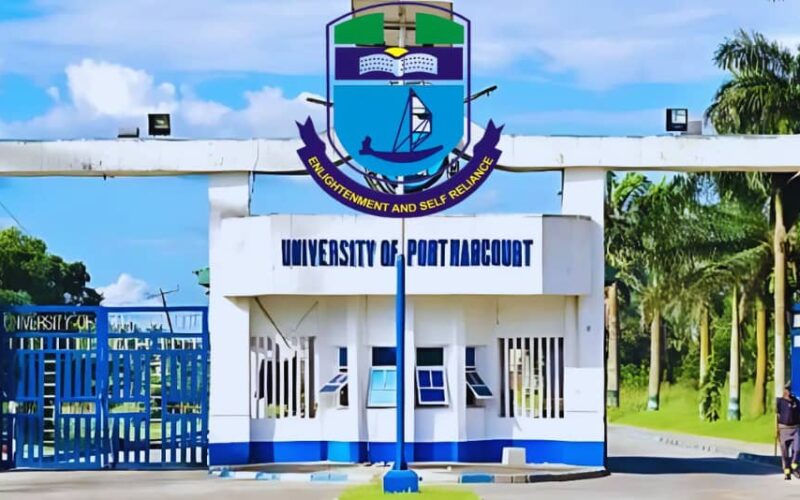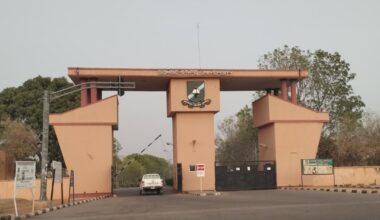What Happened
It was reported that a police corporal, identified as Onukwue Godswill, who is attached to the Elimgbu Division in Rivers State, and a 200-level student of Biomedical Technology at the University of Port Harcourt (UNIPORT), named Ifeanyi Israel, were arrested for allegedly leading cult-related activities on campus.
The arrests followed the “sign-out” ceremony of final-year students at UNIPORT, during which the internal security team at the university observed suspicious behavior. The student and the corporal were allegedly on campus to lead a clash with rival cultists.
What Was Found
Once the suspects were detained:
- During the arrest, authorities recovered two locally made pistols, four rounds of live cartridges, two rounds of 9 mm live ammunition, and one small axe from them.
- A further search of the corporal’s residence revealed another locally made pistol and two machetes.
- The suspects are currently in police custody. The Rivers State Police Command says there is an ongoing in-depth investigation to uncover the full extent of their involvement, accomplices, or networks.
- The Commissioner of Police, Olugbenga A. Adepoju, reaffirmed the command’s commitment to security and declared there will be “no hiding place for criminals.” The public is urged to remain vigilant and report suspicious activity. T
Key Issues and Questions
This incident raises a number of important questions and concerns, which are worth exploring in any serious commentary:
- Breach of Trust by Security Personnel A corporal in the police force is expected to uphold peace, enforce laws, and protect citizens. The allegation that one is leading cultists blurs the line between enforcement and criminality. What systems exist to vet or monitor low-ranking officers? How often do such betrayals occur, and how are they punished?
- Role of Students & Campus Security University campuses have long been hotspots for cultism in Nigeria. What is the effectiveness of current internal security units in universities? The fact that the university’s internal team spotted and reported the suspects suggests some effectiveness—but also begs the question: what preventive measures (beyond enforcement) are in place to reduce cultism culture in schools?
- Weapons Proliferation and Access The materials recovered—guns, bullets, machetes—raise questions about how cult groups (and allegedly, members of security forces) are getting access to dangerous weapons. What control measures are there on small arms? Why are locally made weapons so common?
- Institutional Response & Investigation The case is being investigated, but how transparent will the process be? Will the prosecutorial system be able to pursue a case involving one of its own, and bring justice? Will charges be pressed, and will they stick?
- Community Impacts Cult clashes are known to cause loss of lives, fear, economic disruption, and reputational damage to institutions. The presence of a police officer allegedly leading cultists may worsen public trust in the police. What can be done to restore or maintain trust?
Broader Context: Cultism in Nigerian Universities & Policing
To understand this case fully, it’s helpful to place it in the broader national context:
- Historical prevalence: Cultism (or “secret cults”) has been a persistent problem in Nigerian higher institutions, sometimes erupting into violent clashes, sometimes used for cover for other criminal activities.
- Law enforcement challenges: Many universities have security outfits, campus police, internal security groups, but sometimes they are under-resourced or lack capacity. On the other side, sometimes security personnel are implicated in abuse of authority or corruption.
- Government & policy efforts: There have been various legislative and enforcement attempts to curb cultism, anti-cultism police units, raids, arrests. But success has often been inconsistent.
- Social drivers: Some students are drawn into cults for protection, identity, peer pressure, perceived power, or economic gain. Sometimes cult affiliation becomes a social marker or symbol of status, or even a way to settle personal vendettas.
- Role of religious & community bodies: Parents, religious leaders, and community elders often are called upon to help in prevention, but their influence may be limited or undermined in environments with weak governance.
Implications & What Could Be Next
Here are some likely implications, possible outcomes, and what to watch:
- Legal proceedings: The suspects may be formally charged with offenses such as illegal possession of firearms and ammunition, leading a cult group, incitement to violence, assault or attempted murder (depending on evidence of clashes or intended harm). The involvement of a police corporal may complicate matters.
- Investigations into networks: Police say they’ll look into whether there are accomplices. It could expand into other student leaders, other officers, or off-campus cult groups.
- Institutional reforms: The university might review its sign-out or matriculation policies, internal security protocols, and collaboration with state law enforcement.
- Public reaction & trust: This case could deepen public cynicism about police integrity, or fuel demands for more oversight and accountability. If handled well, it could become a turning point to show seriousness in the fight against cultism.
- Policy consequences: The state government or security agencies might propose stronger regulations around university security, application of stiffer punishments, more funding for internal security, or better control of locally made weapons.
What Should Happen / What Can Be Done
Finally, constructive suggestions:
- Transparent and Impartial Prosecution: The police and state attorneys should ensure that the case is not just a statement but leads to fair trial, with both suspects (including the police corporal) treated equally under the law.
- Strengthen Oversight of Police Personnel: Internal police disciplinary mechanisms should monitor behavior of officers, especially at the lower ranks. Officers should be held accountable when they breach trust.
- Preventive Education in Universities: Schools can run awareness campaigns, counseling, mentoring programmes, peer group interventions to discourage students from joining cults. Empower student bodies and faculty to spot early warning signs.
- Regulation of Firearms: Crack down on manufacturing, circulation, and possession of locally made weapons. Strengthen border and local policing to intercept illegal weapons.
- Community Engagement: Parents, religious leaders, local chiefs, community residencies need to be engaged as partners. Often solutions aren’t only about law enforcement, but social alternatives, community support, visible opportunity.
- Support for Victims & Witness Protection: Cult clashes often involve victims, some of whom may fear exposing cultists. Systems for anonymous reporting, whistleblower protection, and victim support are essential.
Conclusion
This is a troubling case in Rivers State that highlights intersections of law enforcement, higher education, youth culture, and illegal arms. When a member of the police is implicated, the stakes are higher: trust in institutions is tested, and the public will be watching closely. The way this case is handled—investigations, prosecutions, transparency—will matter not just for the two suspects, but potentially for how Nigeria at large confronts cultism and internal security challenges in schools.






